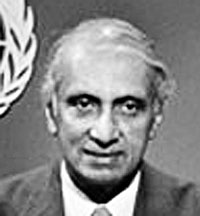Columns
Cabraal’s logic: Better a recovery plan criticised than no plan at all
View(s):Central Bank Governor Ajith Nivard Cabraal had to field some tough questions on Friday after the Monetary Board’s policy review meeting.
In a surprise move, the Monetary Board decided to raise rates and suggest a fuel price hike to manage the ongoing economic crisis. 
As Governor Cabraal is adamant not to go to the International Monetary Fund (IMF) despite strong views in support of the move in the Cabinet of ministers and among economists, he said even the Central Bank came up with some suggestions to the Government similar to what may be the IMF’s answers to the
Sri Lankan crisis.
“If you go to the IMF, there can be worse arrangements which will be looked at and then, those will have to be done. Would you prefer, the IMF telling that, or the Cental Bank saying that? We are telling the government, to make the choice,” the Governor said.
One journalist inquired from the Governor on the fate of his ambitious six month road map plan soon after he assumed duties. The Governor responded saying: “when plans are made, people can criticise it but at the same time if you don’t have a plan, where are you going? We have pursued the plan. There will be certain challenges that will occur”.
To back up his case, Governor Cabraal asked the journalists whether any of them thought of the potential conflict in East Europe in advance. He concluded: “Our plan was not a statistical one but a dynamic one”.
Stressing that some of those plans needed some time to materialise, the Governor indicated that some of those policy decisions would take some more time to be properly implemented.
As the Governor concluded this response, one of the journalists was heard saying to his colleagues an old adage: “The operation was successful, but the patient died”- referring to the hardships the people of the nation are facing on a daily basis as the Central Bank is engaged in playing with new ideas, which are really old ones, with controls when the country’s economy is at its worst situation since independence.
 Pigeon Island: Troubled bridge collapses together with promise to build new one
Pigeon Island: Troubled bridge collapses together with promise to build new one
Several people suffered minor injuries when the bridge connecting the temple on Pigeon Island (Paravi Doopatha) to the mainland in Matara collapsed on Friday. The bridge, constructed by the late Minister Mangala Samaraweera, had been in a dilapidated condition for years.
Matara District Parliamentarian and District Development Committee Chairman Nipuna Ranawaka had promised more than a year ago that a new bridge would be constructed connecting the islet to the mainland.
His own official Facebook page carried a post and images of him visiting the bridge with Minister Chamal Rajapaksa in January last year. Mr Ranawaka had claimed in the post that a new bridge would be constructed on the site immediately.
Yet, when the dilapidated bridge finally collapsed on Friday with dozens of people still on it, there was no a sign of a new bridge.
Political rivalry in Jaffna DDC; PM intervenes and appoints his nominee
The ongoing political rivalry within the Jaffna District Development Committee (DDC) resulted in an appointment of a direct representative from the Prime Minister’s office, this week.
Premier Mahinda Rajapaksa’s Coordinating Secretary G. Kasilingam has been nominated as the representative by the Prime Minister’s office at DDC meetings and Divisional Coordinating Committees to “ensure smooth coordination”, according to the letter issued by the PM’s Secretary Anura Dissanayake on Wednesday.
Currently, Sri Lanka Freedom Party Parliamentarian Angajan Ramanathan and Northern Governor Jeevan Thiagarajah function as Co-Chairmen of the Jaffna DDC while Fisheries Minister Douglas Devananda was appointed as Co-Chair for the Kilinochchi DDC.
In the recent past, there were allegations that political favouritism took the lead in the Jaffna district when selecting beneficiaries for housing and other government initiatives in the district. This forced the previous Governor to subject them for review.
S. B. unintentionally downplays portfolio given to him
After being excluded from the Cabinet over the past two years, Nuwara Eliya District Parliamentarian S. B. Dissanayake was sworn-in on Thursday as the new Industries Minister. He replaced National Freedom Front Leader and Minister Wimal Weerawansa, who was sacked by the President on Friday.
It was no secret that Mr Dissanayake had been disappointed with not being given a Cabinet portfolio earlier. He tried to make light of it by saying he was attending to his estate, but the bitterness was easy for anyone to see. It had earlier been reported that Education Minister Dinesh Gunawardena would replace Mr Weerawansa as Industries Minister and Mr Dissanayake would be given Education; a post that he had held before and which he had hinted was one he was again interested in, though it did not materialise.
After being appointed as a minister on Thursday, Mr Dissanayake told journalists the new portfolio was no challenge to him as he had held far more important Cabinet positions before.
“If you take politicians in this government, only Prime Minister Mahinda Rajapaksa has held a larger number of senior Cabinet posts over the years than me,” he told the media. Unintended maybe, he downplayed the importance of the ministry allocated to him.
UN General Assembly resolution against Russia: Lanka’s abstention linked to Moscow’s US$ 300m credit line?
When the United Nations General Assembly–known as the world’s town hall–convened on Wednesday to demand an end to the Russian offensive in Ukraine through a non-binding resolution, Sri Lanka was among the 35 countries that abstained. Hundred and forty one countries voted in favour while five countries voted against it.
Notably, neighbouring India too abstained in the vote but through its diplomatic channels, it secured a brief six hour window of no retaliation from the Russian side to evacuate and repatriate its citizens, mostly students, from the conflict zones.
The reason for Sri Lanka’s stand made sense hours later, when news broke that then Government requested for US$ 300 million Russian credit line to purchase crude oil, gas and coal from the country that is waging war on its neighbouring country. A Russian trade delegation headed by the Industry and Trade Deputy Minister was also in the capital this week.
Former UK ambassador to Sri Lanka James Dauris, who currently heads the UK’s Foreign Commonwealth Development Office, asked a rhetorical question on Twitter with a list of countries that abstained in the voting. “If your country abstained, do you feel proud of how it voted?”
Responding to it, a former Sri Lanka Foreign Service official responded: “Well, according to the Sri Lankan Foreign Minister’s logic an abstention at the UN is a No vote. So, No.”
Presidential Secretariat says no power cuts from yesterday, but confusion among people
Looking at the state bureaucratic affairs these days, one may wonder whether policy decisions are being taken at the highest levels based on scientific reasons or are there plans in the first place to overcome the unprecedented economic woes in the country?
On Wednesday, ministers and top officials attached to various ministries that involve power, energy and fuel imports were summoned for an urgent meeting at the Presidential Secretariat to discuss the ongoing power crisis which has resulted in more than seven hour long power cuts across the country.
After lengthy discussions followed by remarks by President Gotabaya Rajapaksa who insisted that “all responsible parties are taking steps to ensure uninterrupted power supply”, officials assured there would be no power cuts from yesterday (March 5).
Following the meeting, a statement was issued by the Secretariat assuring the people there would not be any power cuts since distribution of fuel to all fuel stations across the country would be normalised from next day. However, kilometre long queues lined up at midnight in front of fuel sheds waiting hours to purchase limited fuel supplies.
For many in various walks of life, the six hour power cut window caused immense difficulties in their daily routines. The worst part, one mother with an infant said that sometimes power outages exceed six hours and they only get two hours power to recharge their digital gadgets to get ready for the next power cut.
Women’s Day affairs in Jaffna tomorrow; call for 13A in full and early PC polls
Marking International Women’s day on March 8, the Women’s wing of the Ilankai Tamil Arasu Katchchi (ITAK) has organised an event tomorrow in Kilinochchi. The event is titled “Tamil Nationalistic Womens Day-2022.”
Taking part as chief guest in the event is the Indian High Commission’s Counselor Banu Prakash. The party’s women’s wing is busy organising the event these days by reactivating its regional groups in other districts to mobilise them as Provincial Council elections are said to be round the corner.
During an interactive dialogue on the report of the UN High Commission for Human Rights on Sri Lanka last Friday, India’s representative also called for the full implementation of the 13th Amendment and conducting PC polls at the earliest.

Late Dr. Gamani Corea
All Third World nations had IMF as common Finance Minister
With the foreign exchange starved government now veering towards seeking assistance from the International Monetary Fund (IMF), an interesting anecdote from New York-based veteran Sri Lankan journalist Thalif Deen’s recent book No Comment is worth a mention.
It sheds some light on how Third World countries perceived the IMF in years gone by.
Here is the relevant excerpt:
Gamani Corea, a former Governor of the Central Bank and ex-Secretary-General of UNCTAD (United Nations Conference on Trade and Development), was one of the harshest critics of the World Bank and the International Monetary Fund. Addressing a luncheon at the UN delegates dining room, he castigated the two Bretton Woods institutions for their obsession in laying down stringent conditions–euphemistically called “structural adjustment policies”(SAPs)–in return for concessional loans to the world’s poorer nations. The tragedy of it all, he said, is that virtually all of the crises-stricken Third World nations have a common finance minister: the IMF.
As if to reaffirm Gamani Corea’s contention, New York Times columnist Tom Friedman recounted in his book on globalisation an anecdote about a newly-appointed Indian finance minister being congratulated by a friend.
“Don’t congratulate me,” he tells the friend, “I am only half a minister. My other half is in Washington” (read: IMF).
The IMF’s demands from developing nations usually include the removal of state subsidies, privatisation of government corporations, downsizing of bureaucracies, devaluation of national currencies, reduction of budgetary deficits, and sharp cuts in military spending and government salaries.
In effect what the IMF says to most developing nations is: If you don’t play the game by our rules, you don’t get anything from us.
Buying or selling electronics has never been easier with the help of Hitad.lk! We, at Hitad.lk, hear your needs and endeavour to provide you with the perfect listings of electronics; because we have listings for nearly anything! Search for your favourite electronic items for sale on Hitad.lk today!


Leave a Reply
Post Comment